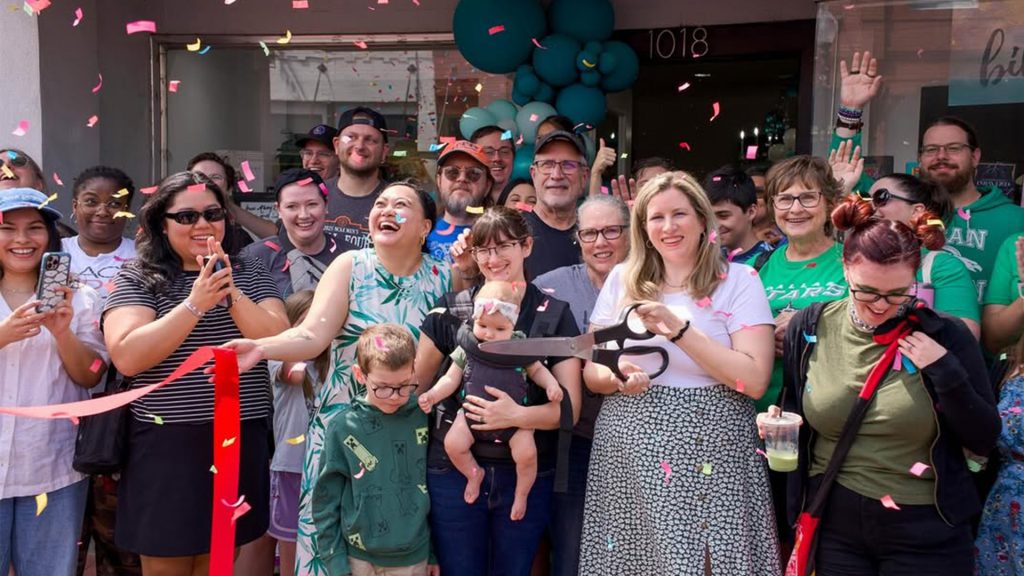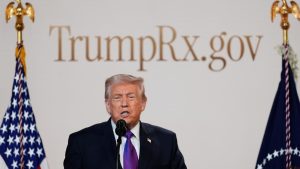‘Beyond the page’: Behind the local bookstore boom across the US

The digital age of convenience and one-click buying didn’t stop Chelsea Tresp from opening her own brick-and-mortar bookstore earlier this year in Plano, Texas. In April, Tresp opened the doors to Bibliobar, a space that has quickly become a refuge for local readers and authors — a safe space for anyone who felt like they didn’t quite fit in with society.
“It’s been incredible to see the community respond so positively in such a short time,” Tresp told Straight Arrow News.
More and more independent bookstores are popping up across the Dallas-Fort Worth area and nationally, despite the rise of online shops and Amazon.

“People want spaces to linger, connect and explore, not just buy a book,” Tresp said.
Independent bookstores provide more than just books. They’re “experiences, community hubs and safe spaces for readers of all ages,” said Allison Hill, CEO of the American Booksellers Association.
Hill told SAN that independent bookstores also champion voices, encourage reading and promote literacy. While the resurgence of independent bookstores in the U.S. can be credited to several factors, Hill and Tresp both said a desire for community sits at the center.
70% rise in new independent bookstore openings
Since 2020, the number of independent bookstores across the nation has grown from 1,916 to 3,218 – a 70% increase, according to data from the ABA.
Unbiased. Straight Facts.TM
The American Booksellers Association had 7,000 member stores when Amazon was founded in 1994. Then came the drop. But in recent years, numbers have rebounded, from 1,916 in 2020, back to 3,281 this year.

And while the trend can be traced across the country, Texas is a central player. Last year, the ABA recorded 323 store openings, including 21 in Texas. This momentum continues into 2025, with 100 new stores opening across the country so far, 13 of which are in Texas. Notably, the rate of new store openings significantly exceeds closures, with four new bookstores opening for every one that shuts.
Hill attributed the rise in independent bookstores to the pandemic, an experience she understood intimately, having begun her role as CEO just days before the national shutdown. Navigating the economic uncertainty brought its own challenges, but Hill noted it didn’t slow down the literary revival.
Instead, the pandemic fostered flexibility and innovation in bookstore openings, leading to the rise of pop-up, online, and mobile formats.
“People were cashing in retirement to open bookstores during the pandemic. That shows passion,” Hill said.
Plus, independent bookstores offered readers more than entertainment. Many provided support by acting as community centers that hosted food banks, conducted COVID-19 testing and offered resources. As people craved a space where they could express themselves and feel connected during a very isolating time, bookstores delivered.
“We saw tremendous rallying from communities that showed up to support local businesses,” Hill said. “We started seeing what has ended up being a trend the last five years, of people really being reminded of their values during the pandemic and trying to shop in a way that aligned with their values. In this case, shopping with authentic businesses that were run by human beings, not algorithms, and connecting personally.”
More than just books
Reading remains a popular pastime, but many booksellers offer more than books. Tresp’s goal for Bibliobar is to eventually turn it into a bar that serves cocktails and coffee, providing a space for readers to connect beyond the pages.
“There’s a growing appreciation for the personal touch that independent bookstores provide — people are craving a connection that big-box stores and online retailers can’t give,” Tresp said.
Javier García del Moral first introduced The Wild Detectives, a bookstore-bar venue, to the Dallas literary scene in 2014. It helped shape the local cultural landscape as García del Moral and his friend Paco Vique sought “a space that could mix two of their passions: books and booze.”
García del Moral told SAN that to be profitable, “independent bookstores have had to diversify with coffee shops, bars, gift items, workshops … all of these things add value and bring people in.”
Since opening his shop, García del Moral has observed significant changes in Dallas’ literary scene.
“Fifteen years ago, if you asked most people whether Dallas was a literary city, they might have thought you were joking,” he told SAN.
“Today, most people recognize that the city has a vibrant literary life — whether that’s through festivals, publishing houses, bookstores or other cultural initiatives,” García del Moral said. “This transformation hasn’t happened overnight. It’s the result of sustained effort from many people and organizations who have been part of the scene.”
García del Moral said he noticed signs of increasing interest in the literary world and independent bookstores when he opened The Wild Detectives in 2014.
“More people were becoming aware of the gaps in what platforms like Amazon could offer,” he told SAN. “In Dallas, we already had Half Price Books, which — although very different from us — was still providing a type of service you couldn’t get from an online store.”
Amazon and big box stores just weren’t doing it for local communities.
“The whole concept of a bookstore with a bar or a café — it makes the space feel alive. People linger, connect and discover books they might never pick online,” García del Moral said.
The age of convenience
Amazon and large chain stores have become a convenient choice for many consumers. However, a November 2022 report from ABA in partnership with Civic Economics found that roughly 29% of all revenue generated by independent bookstores circulates within the local economy, resulting in a 405% greater local impact than purchases made through Amazon.
“The online market has, ironically, made many realize that places like bookstores — or record stores, or neighborhood cafés — offer far more than a simple transaction,” García del Moral told SAN. “They are spaces where people can gather, discover new things, and connect in meaningful ways.”
Still, even local shops must compete online.
The rise of e-commerce platforms like Bookshop.org, which hosts websites for more than 1,400 American independent booksellers, has provided new opportunities for independent bookstores.
New technologies are great, said García del Moral. But they don’t solve everything.
“There’s also a paradox with new technologies: they connect us on a global scale, but they often isolate us. That makes it even more important to have physical spaces where we can meet people face-to-face, be exposed to different ideas and experience the world in a more tactile, human way. Bookstores fit that role perfectly, which is why we’re seeing a renaissance of these types of spaces.”
While technology has allowed many Americans to adopt new ways of consuming books, that tactile approach persists.
According to an NPR-Ipsos poll, two-thirds of Americans have read a book or ebook or listened to an audiobook in the last year. Still, the poll found that 64% of Americans prefer reading a physical book, while 21% prefer an e-reader.

And sales are up.
The Association of American Publishers reported that total sales increased by 4.1%, to $32.5 billion over 2023, while the number of books sold rose by 3.4%, to 3.1 billion.
There has also been a rise in niche and themed shops. Hill noted that 157 of ABA’s members have opened romance-specific bookstores, including 43 within the last year and a half.
“Genres like romance or horror allow authors to explore stories that might not fit in traditional categories … independent bookstores are championing these voices,” Hill said.
Social media and BookTook have also played a significant role in attracting new readers and increasing book sales.
Book bans and legislative challenges
An increase in independent bookstores comes with its challenges, though. The ABA has been actively fighting laws that limit book access and sales. Texas, in particular, has been a hotspot for such laws, with House Bill 900 and the Reader Act posing serious threats to independent bookstores.
“There’s significant concern about laws like Texas House Bill 900,” Hill said. “It compels bookstores to rate books’ sexual content for schools, which is impossible to enforce and unconstitutional.”
The ABA is actively involved in lawsuits to defend the rights of bookstores and readers, Hill said. She also warned that the next two years might be more difficult for independent bookstores than past challenges related to legislation.
“Independent bookstores are a bridge where libraries or schools can’t always meet the demand,” Tresp told SAN, “especially when legislation limits access.”
Tresp and Hill believe that the rise of book deserts and increased legislation has contributed to the growth of independent bookstores.
“We’re seeing bookstores start nonprofits or little free libraries just to get banned books into kids’ hands,” Hill told SAN.
Despite challenges, Hill said the future looks promising for independent bookstores, as many new shops open and current ones adapt to shifting market trends. She emphasized what matters most in supporting the literary community: community itself.
Back to what matters: Community
Opening Bibliobar was Tresp’s lifelong dream. Not only has she been able to surround herself with her passion — books — but she has also created a welcoming space for everyone.
But Tresp’s favorite part about owning a bookstore is “seeing someone discover a book and connect with a story — that’s the reward of this work every day.”


While independent bookstore openings may not continue at such a fast pace, García del Moral believes the demand is solid.
“I’m not sure that a 70% growth rate can be maintained indefinitely—it will probably level off at a more stable number at some point. That said, I do think the overall trend is here to stay,” he said.
“Given how the world is going, more and more people will continue to seek spaces where they can express themselves freely, talk about the things that matter to them without judgment and feel welcome no matter who they are, where they come from or what they do. Bookstores, when they are open and inclusive, provide exactly that kind of space.”
For booksellers like Tresp and García del Moral, owning an independent bookshop is about more than selling books. It’s about creating and fostering a welcoming environment.
“Our focus has always been on community,” Tresp said.
The post ‘Beyond the page’: Behind the local bookstore boom across the US appeared first on Straight Arrow News.















